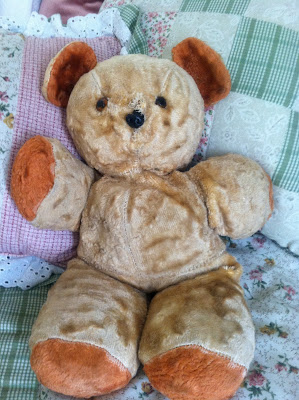For Christmas of 1955, when I was three-years-old, Santa
Claus brought me a teddy bear that was as almost as big as I was tall. I was
amazed at my good fortune, and smiled with pride when anyone would remark: “My
goodness! That bear is about as big as you are!”
But that’s all I remember about “the bear that is big as me”
because it was lost when we moved from Oklahoma to Illinois that next June.
When my dad graduated from Oklahoma State’s veterinary
school in 1956, he landed a job working for another veterinarian in Pontiac,
Illinois. That summer, my family of five set out for new adventures.
We had one car and not much money, so my parents packed up
all our belongings in the car and a small trailer. The plan was that my dad
would drive the car to Illinois and my mom, my two brothers, and I would follow
on the train.
Somewhere en route, my dad had a car accident on Route 66
and was thrown from the car. He was not badly hurt, but the car was wrecked.
Dad took all our stuff out of the car before it was hauled off to the
junkyard—or so he thought. But when I asked about my bear, it was nowhere to be
found. I had placed it in the back seat of the car, and all anyone could
imagine was that the impact of the accident had pushed it under the seat out of
sight. I couldn’t understand how a “bear that is big as me” could be lost, but
there you have it.
I wailed, I cried, I thrust out my lip in a heart-broken
pout, and I refused to be consoled—until my older brother, Curt intervened.
“Here, Laura, you can have Pooh,” he said, and handed me the
little golden-colored teddy bear that he had received when he was about my age.
The A.A. Milne tales of Winnie the Pooh and Christopher Robin were favorites of
Curt’s in his early years, and he had aptly named his teddy for the lovable
“silly old bear” in the stories.
Maybe Curt thought that a seven-year-old boy was too grown
up to have a teddy bear any longer, or maybe he just wanted to coax a wailing
sister into quieting down. But whatever the reason, his generosity shocked me
into grateful silence.
Pooh became my treasured companion. Thereafter, I slept with
Pooh bear every night, and when I occasionally would awake, trembling, with a
nightmare and creep into my parents’ bed, Pooh would come along. In the
morning, I often would discover that Pooh’s little black nose had fallen out from
his snout, and my mother and I would search through the bed sheets and blankets
until we found it. No amount of gluing ever seemed to permanently secure Pooh’s
nose in place.
Today, Pooh has an honored spot on the bed in our guestroom.
He has been to camps and to college; he has lived in dorms, apartments, and
houses in fourteen cities or towns in eight states.
After more than fifty years, Pooh surely has paid witness to many things, but the sweetest would still be a big brother’s generosity.
After more than fifty years, Pooh surely has paid witness to many things, but the sweetest would still be a big brother’s generosity.


